After my husband died, I changed my parenting style. I let my kids swear, eat in front of the TV, and sleep in my bed.
Holly Matthews, 39, became a single mom after losing her husband to cancer in 2017.
The couple had always kept things structured regarding bringing up their daughters.
Matthews practices a more relaxed style of parenting to help them deal with the death of their dad.
This as-told-to essay is based on a conversation with Holly Matthews. It has been edited for length and clarity.
When my husband Ross was alive, we were a family that observed schedules and had certain rules.
Our daughters, Brooke, now 13, and Texas, 11, followed routines. Many of them were set by Ross, who was autistic and liked things to be structured and more regimented.
We sat down every evening for a meal together. The girls had set bedtimes. They didn't come into our bedroom, which we kept as Mom and Dad's space.
I was comfortable with our style of parenting. It seemed to work well for everyone.
But, after Ross died of brain cancer in July 2017 at 32, I was forced to rethink it. Practically speaking, it was harder to maintain structure when only one person was enforcing it.
But it went deeper than that. I quickly realized that rigidity wouldn't give the girls enough time to process their feelings and emotions.
I'm OK with letting things go and dropping the ball
I didn't let them run wild or be disrespectful — but things changed. I became a more flexible parent. I've heard it called jellyfish parenting or "going with the flow." The best way to describe it is to be OK with dropping the ball.
Before Ross died, I always assumed we'd be strict about using devices at the table and going to places like McDonald's for chicken nuggets. I thought my kids would never swear at home.
But, when you're dealing with heightened emotions caused by grief and loss, you have to pick your battles. If you're exhausted after going toe-to-toe for three hours solid, it's fine to let things go.
If sleeping in my bed when they've woken up during the night helped reassure them or eating in front of the TV was more relaxing, my girls could do it.

Brooke was particularly anxious after Ross died. She worried about losing me, too. She would make me justify anything I did in case it was too dangerous, whether going somewhere different or driving for a long distance. She'd get up in the night to check on me.
She was only 6 at the time, and Texas was 4. It was a lot for them to deal with. They're still dealing with it, and I want them to experience as little extra stress in their lives as possible.
I also let them off-load. One day, Texas came home from school and said she'd needed to tell a teacher that her dad had died. The teacher had said, "Oh, that's not very nice."
Texas was confused. I told her it's "not very nice" when you drop your ice cream or something like that. "It's fucking shit when your Dad is dead," I said.
So, I allowed them to swear when they were very young — at least at home. It was a tool because they needed to get their emotions out. At that age, swearing was such a shocking thing to them; it matched how they were feeling internally. It reflected their rage, loss, and sadness.
We still have boundaries in place
We'd listen to music when we were driving to school. One of our favorite songs was "Fuck You" by Lily Allen. We'd sing along. It felt liberating to shout the lyrics out loud.
Meanwhile, we're very direct as a family — we had to be. I've chosen absolute honesty. "There will never be any lies with me," I've told my daughters. "You can ask me any question you want, and I will tell you the truth." I never hide things from them, including my own emotions. I share my philosophy in my work as a self-development coach.
But it's not to say we don't have boundaries. The girls know there will be consequences if they over-step them. However, I have much more of an understanding of why some behaviors come up. If a child has been through something as traumatic as they have, trying to "teach them a lesson" isn't necessarily going to work.
I sometimes look back at my attitude to parenting before Ross died. It often came from a space of naive judgment, thinking I had to play by the rules or be considered lacking. But the reality is that you do the best you can.
Do you have a powerful story about your parenting style that you'd like to share with Business Insider? Please send details to jridley@businessinsider.com.
Read the original article on Business Insider
